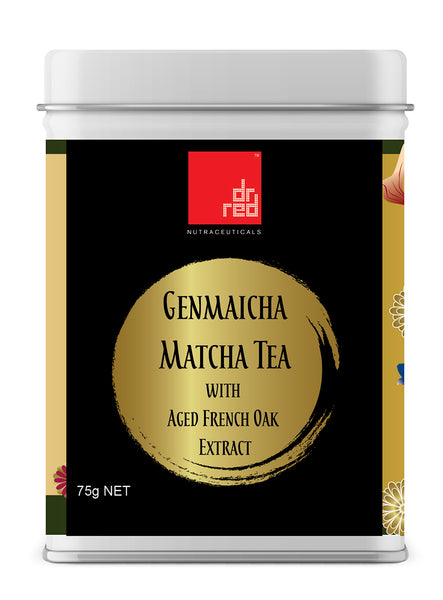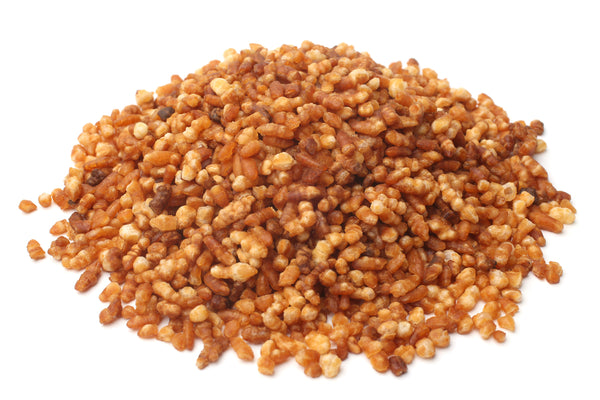Genmaicha Matcha Tea with Aged French Oak Extract
Introducing.......
Dr Red's Genmaicha Matcha Tea with Aged French Oak Extract.
Made from Australian grown Sencha green tea, roasted brown rice and Matcha powder, we have added our infamous Aged French Oak Extract for a more dynamic tea blend. A refreshing and invigorating drink, it has a rustic, nutty flavour from the roasted brown rice and a light and fresh finish from the Sencha and Matcha combination. Serve as it is and take the time to relax whilst having a cup.
Genmaicha (玄米茶, "brown rice tea"), also called brown rice green tea, is the Japanese name for green tea combined with roasted brown rice. It is sometimes referred to colloquially as "popcorn tea" because a few grains of the rice pop during the roasting process and resemble popcorn.
Genmaicha is also sold with matcha (powdered green tea) added to it. This product is called matcha-iri genmaicha (抹茶入り玄米茶) (lit. genmaicha with added powdered tea). Matcha-iri genmaicha has a similar flavour to plain genmaicha but the flavor is often stronger and the color more green than light yellow.
In Korea, a very similar tea is called hyeonminokcha (현미녹차; "brown rice green tea"), while the word hyeonmicha (현미차), which is comparable to genmaicha, refers to a tea made by infusing roasted brown rice in boiling water.
History of Genmaicha
As with most specific tea's origin, there are usually a variety of legend stories to accompany them and genmaicha is no different. Some find that knowing a tea's legend helps to deepen their affection and appreciation for that tea.
It is said that the origins of Genmaicha can be traced back to one fateful morning in 15th century Japan. A samurai, whose name has since been forgotten, was in a meeting with a group of fellow warlords to discuss a military campaign.
Green tea was served as a refreshment, as was the custom then. A servant of the samurai – by the name of Genmai – was in charge to pour the tea. When he came to his master’s cup to pour the tea, a few kernels of roasted rice fell out of his sleeve into the cup of the samurai. The rice, which he had put into his sleeve as a snack to nibble on during the day, proved to be a blessing for many generations of tea lovers to follow. But not so for poor Genmai.
In a sudden fit of anger about the ruin of his beloved tea, he drew his katana and beheaded his servant. Ignoring the blood and corpse, he sat back down at the table and proceeded to drink his tea.
Much to his surprise, he discovered that the rice had transformed the tea and indeed had not ruined it but given the tea a flavour far superior to the pure tea. He fell instant remorse about the cruel injustice he had done to his servant and ordered this new tea to be served very morning in commemoration of his servant. To honour his servant, he named the tea after him Genmai-cha (literally meaning tea of Genmai)
A different explanation regarding the origins of Genmaicha involves the the time of old Kyoto where genmaicha was considered a drink for poor farmers and city dwellers who couldn't afford expensive tea blends. Even people who were malnourished drank genmaicha because it brewed with nutritious green tea and roasted rice, which makes it almost as filling as some foods. Monks who were fasting, soldiers on little rations, and those who couldn't tolerate solid food during recuperation from illness all turned to genmaicza for inexpensive liquid nutrition in times of need.
Kyoto is considered to be the birthplace of genmaicha, where legend tells of a tea farmer who mixed brown rice as a filler in with his cheapest blends so that poor people could afford a pound of tea and get some extra vitamins and minerals along with the tea.
Time to dispel a few Genmaicha Myths
Often called "Popcorn Tea", Genmaicha contains no corn. However a few grains of brown rice do often pop during the roasting process to resemble popcorn.
Genmaicha contains very little caffeine and is much less acidic than other teas due to the starch from the rice.
Contrary to belief, Genmaicha does not induce sleep but it is okay to drink at night because of its minimal caffeine content.
The liquid tea does not contain rice. The rice kernels are steeped alongside the green tea and filtered out before they reach cup via the use of a strainer.
Genmaicha is not brown like the rice it contains, nor is it green like its base tea. After steeping, the colours combine into a light yellow hue, which is why informally you might here it called "yellow tea".
Despite the fact that it contains rice before filtering, genmaicha tea contains no calories.
Genmaicha tea is okay for people who take iron supplements, however, because green tea can interfere with the body's ability to absorb iron, anyone using an iron supplement should take their iron about 4 hours before or after drinking any type of green tea, including genmaicha.
Brewing Genmaicha Matcha Tea
1. Add Tea to Teapot
One teaspoonful per cup is sufficient . This is approximately about a rounded teaspoon. However, you may adjust the amount depending on your own taste.
2 - Add Near-boiling Water to Teapot, and Brew
You will be pouring enough water for the number of cups you wish to prepare (about 120 ml per cup.) So, if you want to prepare 2 cups of tea, then pour 2 cups of water, not more!
Close the lid of the teapot. Let the tea brew for about 2-3 minutes. You may adjust the time for what suits your palate best. DO NOT stir, shake or mix the tea while brewing.
3 - Serve and Enjoy!
Pour small amounts of tea into each cup at a time, and go around until the very last drop is poured. Japanese firmly believe that the last drop of tea determines its taste as a whole!
You can add hot water again to the teapot for a second, or even a third brewing. Open up the teapot between brewing to allow the hot air to escape and cool down the remains tea in the pot before adding more water. The brewing time will need to be reduced to half of original brewing time.







